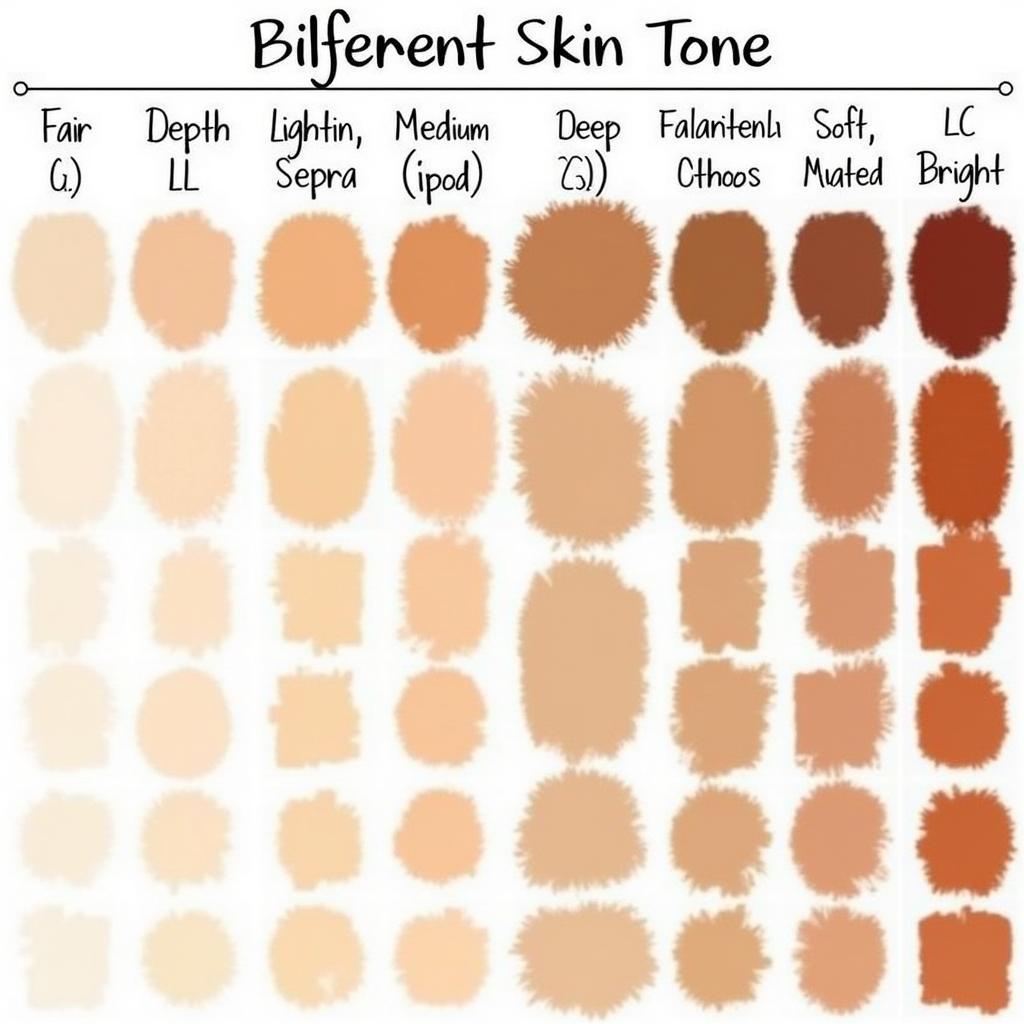Determining your skin color can be more nuanced than it seems. It’s not just about light or dark; it’s about understanding undertones, depth, and the complex interplay of genetics and environment. Knowing your true skin color is the key to choosing flattering makeup, clothing colors, and even hair colors that enhance your natural beauty.
Understanding Skin Tone vs. Skin Color
While the terms are often used interchangeably, there is a distinction. Skin color refers to the surface shade of your skin, ranging from fair to deep. Skin tone, on the other hand, refers to the underlying hue that affects your overall complexion. The three main undertones are cool, warm, and neutral. what is my skin color quiz can help you quickly assess your skin tone.
Determining Your Undertone
Several methods can help you determine your undertone:
- The Vein Test: Look at the veins on the inside of your wrist. If they appear blue or purple, you likely have a cool undertone. Green veins suggest a warm undertone. If you see a mix of blue and green, or if they appear bluish-green, you may have a neutral undertone.
- The Jewelry Test: Which metal looks better against your skin – gold or silver? If gold complements you, you likely have a warm undertone. Silver tends to look better on those with cool undertones. If both look good, you might have a neutral undertone.
- The White Paper Test: Hold a piece of pure white paper next to your face. If your skin appears yellowish or golden next to the paper, you have a warm undertone. If it looks pinkish or rosy, you have a cool undertone. If your skin looks relatively unchanged, you likely have a neutral undertone.
Factors Influencing Skin Color
Genetics plays a significant role in determining your skin color. Melanin, a pigment produced by specialized cells called melanocytes, is responsible for skin pigmentation. The amount and type of melanin produced are genetically determined. However, environmental factors such as sun exposure can also affect skin color, causing tanning or darkening. what color looks best on my skin tone can help you navigate these complexities.
 Genetic and Environmental Influences on Skin Pigmentation
Genetic and Environmental Influences on Skin Pigmentation
Why Knowing Your Skin Color Matters
Knowing your skin color is about more than just satisfying curiosity. It can significantly impact your choices in fashion, makeup, and even interior design. Understanding your skin’s undertones can help you choose colors that complement your complexion, making you look healthier and more radiant. For instance, knowing your skin tone helps you avoid colors that wash you out or make you look sallow.
Choosing the Right Colors for Your Skin Tone
- Cool Undertones: Jewel tones like emerald green, sapphire blue, and ruby red often look stunning on cool skin tones. Pastels like lavender and icy pink can also be flattering. For neutrals, opt for gray, navy, and pure white.
- Warm Undertones: Earthy tones like olive green, burnt orange, and golden yellow tend to complement warm skin tones. Rich browns, creamy whites, and warm reds also work well.
- Neutral Undertones: Lucky you! Neutral undertones can usually wear a wide range of colors. Experiment and see what looks best on you. how to cahnge my skin color in dress to impress provides some helpful tips on using clothing to enhance your appearance.
Beyond the Basics: Depth and Saturation
Besides undertones, skin color also involves depth (how light or dark your skin is) and saturation (the intensity of the color). These factors further refine your color palette and help you choose the most flattering shades. what colors go best with my skin tone dives deeper into this topic.
 Understanding Skin Tone Depth and Saturation
Understanding Skin Tone Depth and Saturation
Conclusion
Understanding your skin color is a journey of self-discovery that empowers you to make informed choices that enhance your natural beauty. By considering your undertones, depth, and saturation, you can create a personalized color palette that flatters your unique complexion. what color is best for my skin tone can be a valuable resource for finding your perfect colors.
FAQ
- Can my skin tone change over time? Yes, factors like sun exposure and aging can affect skin tone.
- Is there an app to determine my skin tone? Yes, several apps claim to analyze skin tone, but their accuracy can vary.
- What is the most common skin tone? Medium skin tones are considered the most prevalent globally.
- Does skin tone affect how I tan? Yes, lighter skin tones tend to burn more easily, while deeper skin tones tan more readily.
- How can I protect my skin from sun damage? Use sunscreen with a high SPF, wear protective clothing, and seek shade during peak sun hours.
- What if I can’t figure out my skin tone? Consult a makeup artist or stylist for professional advice.
- Does skin color affect health? Yes, lighter skin tones are more susceptible to skin cancer.
For assistance, contact us at Phone: 0373298888, Email: [email protected] Or visit us at 86 Cầu Giấy, Hà Nội. We have a 24/7 customer service team.

